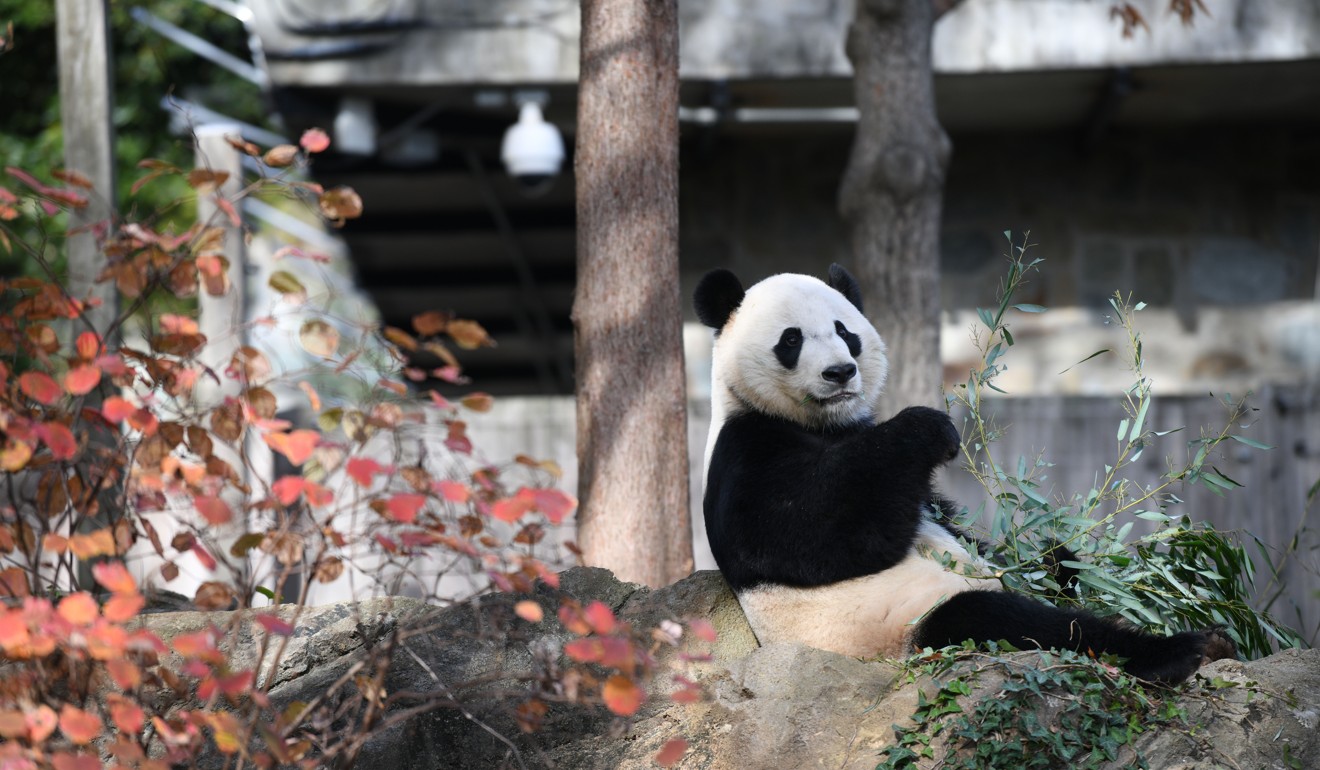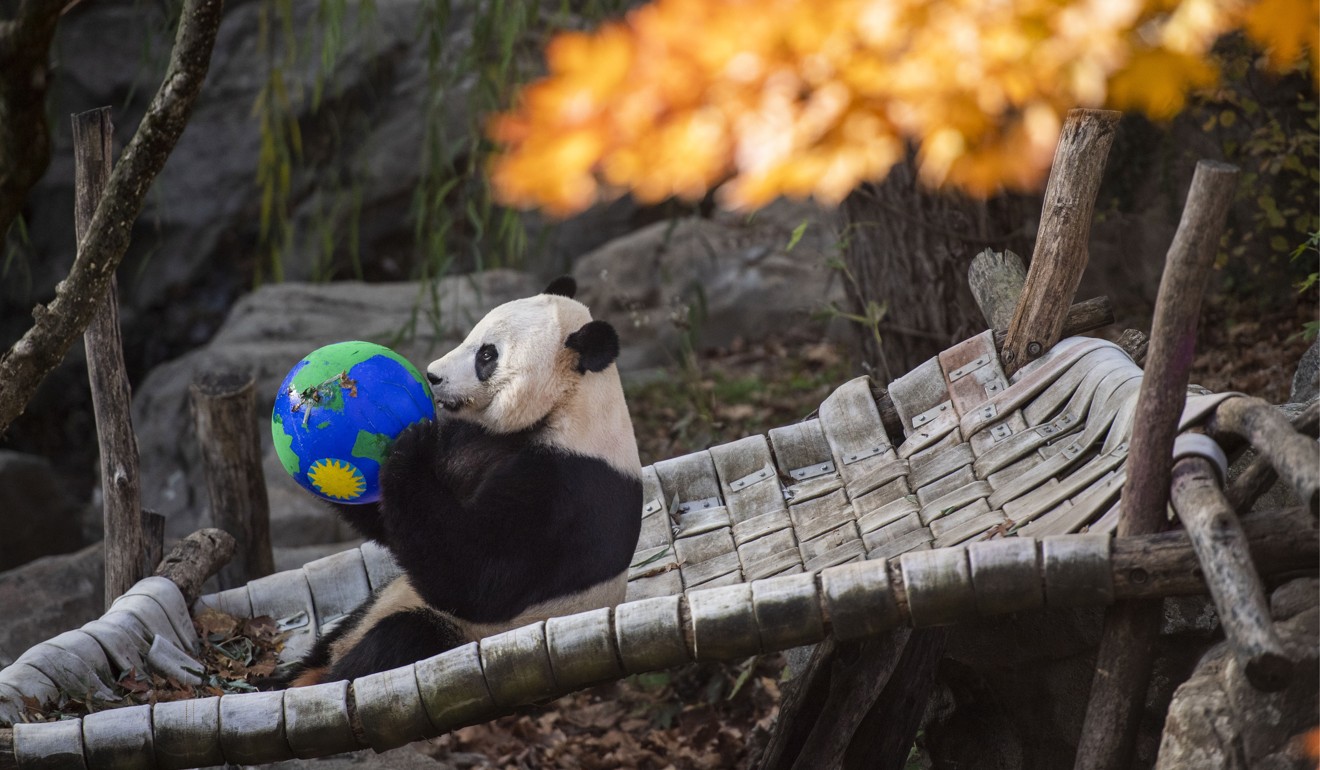
Bei Bei bye bye: devoted US keeper waves farewell to giant panda cub before he heads to China
- At the age of four, the last panda cub at the US National Zoo is leaving for China to enter a breeding programme
- His keeper, who has been with him since birth, talks about 25 years of working with pandas
After they arrive in China, Laurie Thompson hopes to get a few minutes alone with Bei Bei, a giant panda at the Smithsonian National Zoological Park (commonly known as the National Zoo) in Washington DC. It will be a farewell for both, and the end of an era for the zoo, where Thompson has worked for almost 25 years.
Next week, she will accompany Bei Bei on the plane that will carry him to his new home in China.
“I think there’s going to be some tears,” Thompson, the assistant curator of giant pandas and the zoo’s longest-serving giant panda keeper, said. “To leave him in a new place, although I know he’ll be getting great care, it’s just sad.”
Bei Bei is the last of the zoo’s three giant panda cubs to depart, and could be the last cub in Washington for a while, closing a joyous chapter in local history that began 14 years ago. China owns and leases all giant pandas in US zoos. The animals, and especially their cubs, have been part of the relationship between the two countries through good times and bad, from the cold war to the current trade tensions.

“Mei Xiang is of an advanced maternal age,” zoo spokeswoman Annalisa Meyer said. “It’s unlikely she will get pregnant again.”
It’s not clear how, or if, the zoo would get giant panda cubs again. Nor is it clear if the Chinese will want the two adults back when their extended lease expires next year on December 7. Both pandas were born in China.
“It’s hard to say what’s going to happen,” Thompson said. “We don’t know if there will be another extension of our adults or if we will have to send them to China, and if we will get new pandas.”

The National Zoo has had giant pandas almost continuously for 47 years. Thompson cannot envision the zoo without them. “I really can’t,” she said. “I don’t want to.”
Under the agreement with the Chinese, all giant panda cubs born in US zoos must be sent to a breeding programme in China once they turn four. Bei Bei turned four on August 22. He leaves on a 16-hour non-stop flight on November 19. Two of the zoo’s cubs have already been shipped to China – Tai Shan, a male, in 2010 and Bao Bao, a female, in 2017.
Thompson, 48, reflected on her years with Bei Bei and her almost quarter-century of caring for the pandas. She will continue caring for the remaining giant pandas after Bei Bei leaves. “It’s the best job you could ever have,” she said.

A native of the Annapolis area and would-be marine biologist, she started at the zoo in 1994. She witnessed the final years of Hsing-Hsing, who with his mate, Ling-Ling, were gifts from China during the administration of then US president Richard Nixon in 1972. Ling-Ling died in 1992. Hsing-Hsing died in 1999. “He was actually a very sweet bear,” she said. “Very laid back, but also playful … kind of silly, even in his old age. But he was just a really nice guy.”
Mei Xiang and Tian Tian arrived via a lease in 2000. The 2005 birth of Tai Shan, a male, set off panda cub delirium in Washington. Bao Bao, a female, was born in 2013. But it was Bei Bei, born with a short-lived twin in 2015, who got closest to Thompson, she said. His arrival was dramatic. Mei Xiang had already delivered one cub that day, and it was Thompson, watching on a panda video camera, who discovered that she had unexpectedly delivered another.
“We were just sitting in the office and watching Mei Xiang on the camera, and it was like, ‘Something’s happening,’ ” she said. “You could hear vocalisation, and I looked up and she popped out another cub. We were like, ‘Ahhh!’ ” she said.
Giant panda mothers have trouble rearing more than one cub, so the keepers would retrieve one cub so Mei could focus on the other, and then switch them back. After one switch, Thompson, wearing a blue surgical gown, held Bei Bei while a veterinary surgeon examined him. She had never held a cub so young. He was hairless and looked like a naked mole rat, she said.
The following year, on Thanksgiving Day, Thompson was on duty and saw Bei Bei vomiting. “Pandas really don’t vomit often,” she said. He had also been listless. She summoned zoo veterinary surgeons, and Bei Bei was taken to the zoo’s animal hospital for emergency surgery the next morning. She went with him, and was in the operating room as the surgeons worked.
I think there’s going to be some tears. To leave him in a new place, although I know he’ll be getting great care, it’s just sad
“I stayed back,” she said. “I didn’t really want to [see] the gory parts … You wouldn’t want to watch your child’s surgery.” The doctors removed a wad of partially digested bamboo that was stuck in Bei Bei’s intestine. Thompson and colleagues were relieved. “We were afraid somebody threw something in the yard, or he found something and chewed on it and swallowed it,” she said. He recovered fully.
On Monday, Bei Bei, who now weighs 240 pounds (109kg), sat inside an enclosure, gripping the metal mesh with his huge claws as Thompson fed him the chunks of apple. He squawked for more. She told him how smart he was.
Once they get to China, she said, she wants to tell the new Chinese keepers about Bei Bei’s quirks – how he likes to climb trees, doesn’t like his feet to be touched and detests frozen bananas. “I don’t know if they’ll give him bananas,” she said.

